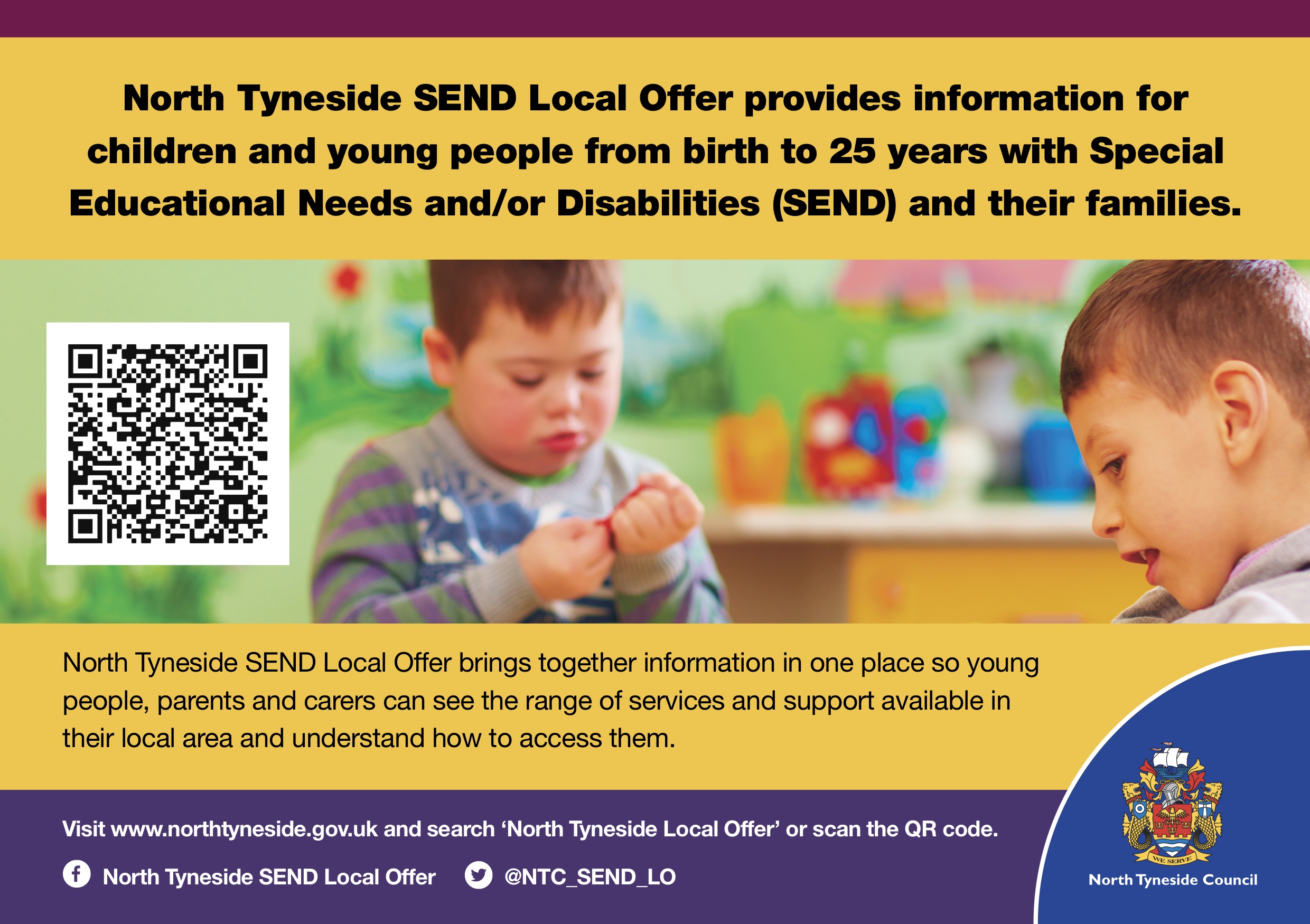Special Educational Needs and Disabilities
Whitley Bay High School is a large secondary comprehensive school for pupils aged 13-18. As a fully inclusive school we strive to ensure that all pupils achieve their potential, personally, socially emotionally, physically and educationally. Our SEND policy, and Single Equality Duty Information Action Plan are available to download and should be read in conjunction with the information report below. Our SENCo is James Mackenzie who can be contacted on the school telephone number, or via james.mackenzie@whitleybayhighschool.org
Whitley Bay High School Information Report for Pupils with Special Education Needs and/or Disabilities.
Our purpose is to prepare our students for life in the 21st Century. In doing so they will become:
flexible in their thinking;
independent in their learning;
effective in their communication skills;
inspired with enthusiasm for continued learning.
Our intent is to actively promote continuing learning throughout the whole school community, in which:
happiness and high self-esteem are developed by recognising success;
change is welcomed;
all demonstrate the conviction that the school in infinitely improvable;
the role of parents in developing learning is explicit, recognised and valued;
technology is used to develop borderless thinking and to transcend the boundaries of time, place and subject content.
Our vision is that as a school community:
we will develop a passion for learning;
we will develop the desire and aptitude to be inquiring, willing to test and hypothesis, and to take risks;
we will become creative problem solvers and effective decision makers;
we will develop high levels of communication skills.
We will achieve this be defining our role as:
inspiring students with curiosity by our example;
developing in our students the capacity to ask questions rather than providing them with answers;
recognising and celebrating the achievement of all students;
identifying and maximising the full potential of all students.
We consult with pupils and their families on our local offer by:
gathering student and parent views from annual SEND reviews;
sending out parent questionnaires;
meeting and engaging with parents regularly through the formal SEND review process, parents’ evening, regular grade and target tracking and feedback, regular pastoral support team meetings and other meetings and interventions as the need arises.
Supporting Pupils with Special Educational Needs / Disabilities and Their Families
Parents are encouraged to let us know of any concerns they have about their child. The school will let families know about any concerns about a pupil in the first instance through contact by the SENCo or a member of the pastoral team. Parents would be invited for an initial meeting to discuss the situation further and develop an action plan.
When a pupil is identified as having special education needs and / or disability, we support their development and progress by:
promptly identifying and assessing students who may have special educational needs as soon as cause for concern has been raised;
working in partnership with students so that they play an active and valued role in their own education, including setting targets, monitoring and reviewing their own progress;
utilising up-to-date assistive technology to support students to achieve their potential across the curriculum;
regularly training (including training for all school staff), reflecting on school practice, and keeping up to date with SEND developments.
developing a rigorous transition process between Y8 and Y9 and between Y11 and Y12 in conjunction with feeder schools, Connexions and other education providers;
monitoring and reviewing student performance and progress, implementing agreed targets and evaluation these termly through the procedures outlines in the Code of Practice 2014;
ensuring students play a full and active role in their SEND review by preparing a presentation which outlines their views, targets and aspirations;
providing the appropriate support to those with identifies special educational needs that includes in-class support as well as interventions tailored to the needs of the student and access to our resource room (S2) during unstructured times and for assessment and homework support;
working in partnership with family members or carers through liaison and support to develop strategies that will allow them to play an active and valued role in the education of their children;
developing a review process which fully take into account the individual personality and needs of the student and their parents;
using the keyworker role to act as a point of contact and an advocate for vulnerable students on the SEND register;
developing strong links within the local authority, including particularly the four feeder middle schools as well as the Secondary SENCo Network of North Tyneside;
working in partnership with appropriate outside agencies to develop a multi-disciplinary approach to planning and implementing appropriate and effective support for pupils;
provide opportunities for wider integration into whole school activities both within and outside the curriculum;
creating detailed pupil support plans in conjunction with students and their parents, that give advice and guidance to staff that work with the pupil;
assessing pupils for exam access arrangements and supporting the ‘work in practice for this across the curriculum’ in line with JCQ (Joint Council for Qualifications) guidance;
making out ‘best endeavours’ to ensure that all students with SEND reach their potential.
Ensuring we are fit for purpose as an Emotionally Healthy School in line with the Local Authority’s Emotionally Healthy Schools checklist.
Who are the other people providing services to children with SEND in this school?
Learning Support Assistants
Student Support Assistants
Specialist Support Teacher
SENCo
Deputy SENCo/SEMH Lead
Assistant SENCo/SEMH
Assistant SENCo/Communication, Sensory and Physical
Learning Mentor
Student Support Coordinator
Whole School Guidance Counsellor
SEMH Specialist
Strong links with Safeguarding leaders.
The other people / agencies and teams providing services to children with a special educational need / disability in school include:
Educational Psychology
Public Health School Nurse
CAMHS and the Primary Mental Health Team
Language and Communication Team
Dyslexia Referral Team
Speech and Language Therapy
Occupational Therapy
MAEPS (Moorbridge Alternative Education Partnership School) Outreach Team
We will work in partnership with other education providers to ensure that pupils make a successful transition to the next stages of their learning, through careful and coordinated planning of the transition. We provide the following support to pupils when they are leaving the school:
support through tutorials to prepare for the next phase of their education, including support writing personal statements;
a range of workshops and talks about College places, apprenticeships including the involvement of past students and the Connexions service;
apprenticeship, college and university events for Y11, Y12 and Y13;
St James’ Park full day event (in conjunction with EBP, Education Business Partnership) to develop exam technique, prepare for life beyond school including mock interview with employers;
St James’ Park pre-visit for pupils with SEND and for those less confident;
by holding guidance meetings with Y11, Y12 and Y13;
working closely with Connexions, including completing the requisite paperwork to support learners beyond school (such as Learning Disability Assessments);
keeping track of pupil destinations throughout their transition process to monitor if any students are in danger of being NEET.
What are the different types of support available for children with SEND in our school?
Students on the SEND register can receive support in the following ways:
targeted support – in class;
targeted support- intervention groups, which includes literacy, numeracy, social and communication skills, independent travel skills, exam access arrangement support and practice, as well as assessment and coursework support
assistive technology ICT equipment, where appropriate;
transition programme to high school and then on to the next phase of education at Post-16;
Focused support from the SEMH Specialist, Learning Mentor, Student Support Coordinator or School Counsellor.
Support staff are placed where they are needed through the school to ensure pupil progress, independence and value for money. To achieve this:
support is organised on a needs basis;
some students, at times, require 1:1 support;
however, the majority of support is shared in class – so that students can reach their maximum learning potential and independence;
exams access arrangement is extremely important including ensuring that pupils work with their exam entitlement as their normal working practice;
students on the SEND register have a keyworker – someone that can act as an advocate;
in class duties: reader, scribe, prompt, guide, differentiate through questioning and other means, liaise with the teacher in terms of planning;
offer a supported safe haven (SEMH Hub or support base) during unstructured times;
out of class – intervention programmes: independent travel, assessment supervision, communication skills group, literacy, numeracy, homework support, revision, Thrive assessment and counselling, liaise with parents and professionals, contribute to reports.
Staff Training
All staff have undergone, and will continue to receive, training in special educational needs and disabilities. This includes training on issues such as differentiation and working memory. Often, lunchtime and after school sessions are arranged with staff for training related to the needs of individual students.
Our fully qualified and trained Special Educational Needs Coordinator provides advice and guidance to staff.
Learning Support Staff training and qualifications include:
National Award for SEND Coordination (SENCo and Deputy SENCo)
Exam Access Assessment Qualifications (CCET and CPT3A)
SpLD Dyslexia , AMBDA, APC - ongoing CPD e.g. Visual Difficulties,
Annual JCQ AAO training .
Level 3 and 4 Autism
Level 3 Dyslexia
Adolescent Thrive
Elklan
RNIB support training
Independent Travel Training
Child Protection
National Strategies: Behaviour, Language and Communication, Autism, Dyslexia.
Supporting Families
The school works in partnership with families to help them support their children’s learning outside of school.
Families are also signposted to services / organisations through North Tyneside’s Local Offer which is available via the QR codes on the posters below:


Alternatively, information can be found by telephoning the ‘Front Door’ service on 0345 2000 109.
Further Information
The government has produced a Green Paper outlining proposals for the reform of support for students with additional needs. This document and a summary is available to download below.
Behaviour and anti-bullying policies are regularly reviewed with a focus on how they affect pupils with special educational needs or disabilities.
Other useful documents such as our SEND Policy are also available on the school website.
The school’s self-evaluation process will look at teaching and learning for pupils with special educational needs and disabilities.
All school-related activities are evaluated in terms of their benefit to the learning and inclusion of pupils with special educational needs and disabilities.
If you would like further information about what we offer here at Whitley Bay High School, then please contact the Special Educational Needs Coordinator, James Mackenzie, on: 0191 731 7070. The Deputy SENCo is Sarah Jones and the SEMH Lead is Charlotte Clarke. The SEND governor is Lisa Trenell.
| School entitlement offer to pupils with special educational needs of disabilities
| |
|
| Support Available Within Schools
|
| Communication and Interaction Needs:
e.g.
|
|
| Cognition and Learning Needs:
e.g.
|
|
| Social, Mental and Emotional Health
e.g.
|
|
| Sensory and Physical Needs:
e.g.
|
|
If you have any concerns about your child’s special educational needs and/or disability, their progress or the support you receive, we would ask that you come into school and discuss matters further with your child’s Head of Year and / or the Special Educational Needs Coordinator.
Although school complaints procedures are in place and can be accessed through our website we would always hope to resolve any issues or concerns informally by working in partnership with parents.
Parents can contact SENDIASS for impartial information, advice and support in relation to their child’s special educational need and / or disability on tel. 0191 643 8313.
